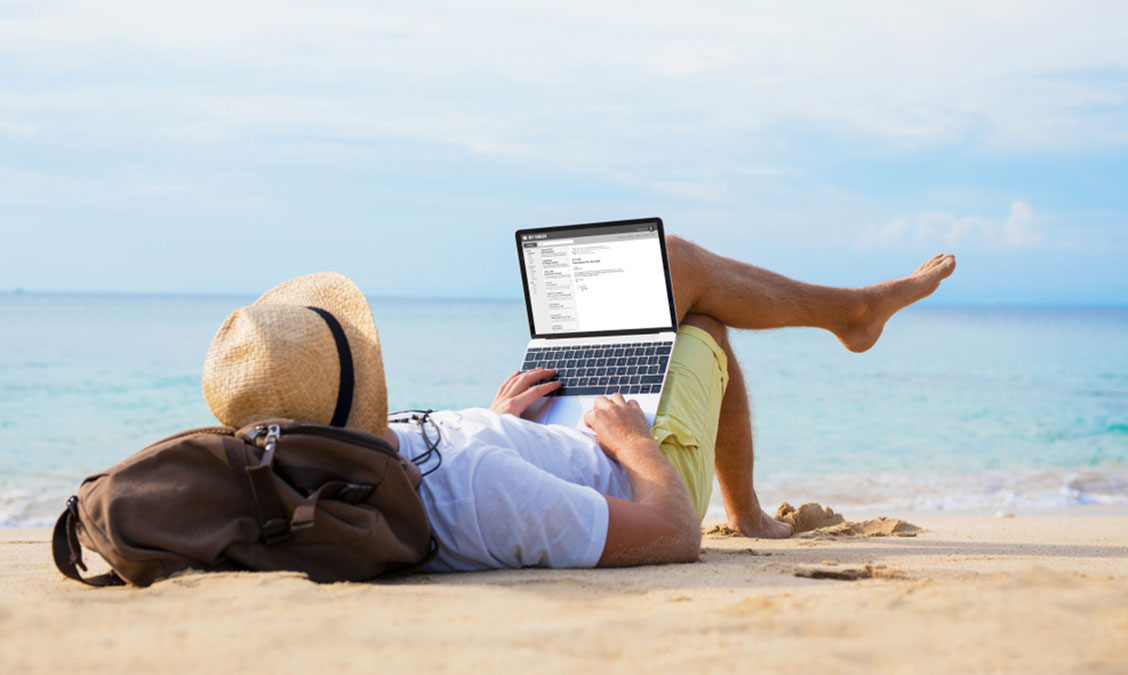Do you find yourself quickly checking work emails on holiday, keeping an eye on the company chat on annual leave, or texting your teams about work even though your ‘out of office’ is on? If so, you need to stop immediately. (You’re also not alone)
The ability to switch off has been getting more complicated, and the work-from-home trend hasn’t helped. In the UK, a staggering 60% of people check work emails on holiday, and the same goes for 63% of people in the US.
Interestingly, around 8 in 10 people believe their managers wouldn’t actually expect them to, suggesting the pressure to check in while on holiday is self-imposed.
The problem of presenteeism and leaveism
Presenteeism, or sickness presence as it’s known, was a big problem a few years ago, which forced companies to address team members feeling the need to show up for work despite feeling ill.
In 2022, 75% of managers admit to actively asking people to take time off when sick, and 45% of leaders say they now stay off to role model the behaviour.
More managers are being given the training to spot the warning signs of presenteeism, but while we’ve been getting that under control this year, a more prevalent work behaviour has been on the rise: leaveism.
Leaveism is when we use annual leave to catch up on work; many people are guilty of it.
A massive 67% of organisations observed leaveism among teams in 2022, with many working on holiday and outside contracted hours to handle workloads.

The work-life balance blur
Data from TextAnywhere shows that employees in the UK struggle to maintain a balance when it comes to leaving work at work. For most, checking emails on personal phones has become the norm, and the line between work and life has become blurred.
Interestingly, one Asana study shows Millennials are the biggest offenders when it comes to checking emails outside of working hours. Around 48% of Millennials engage in work communication outside of working hours, compared to 35% of Gen Z and 28% of Baby Boomers.
One of the main problems is, organisations are not exactly discouraging this behaviour.
Just 1 in 5 companies have a policy that discourages teams from sending and replying to emails after working hours, even though nearly a third of employees do it weekly.
More calls for the right to disconnect are coming from the workforce, and if you’re guilty of checking your work emails on annual leave, it’s time to be strict about disconnecting.
At 51%, just over half the workforce feels less than a month away from burnout, which means stressed teams need a break more than ever.
Read: How to maximise your holiday leave in 2023 in the UK and US
How to unplug

Set yourself a digital detox challenge
- Online searches for ‘digital detox’ are up 10% since last year, with countries like Germany, Singapore, Hong Kong and the UK leading the way for searches. One of the top wellness travel trends for 2023 is set to be a digital detox holiday, where experts are on hand to help people curb addictions to tech.
- Set your own digital detox challenge on annual leave by reducing time spent online. An app like Flipd can help you lock social channels and chats for a specified amount of time so you can focus on other things.
Turn off notifications
- The importance of turning off notifications can’t be stressed enough. Notifications from work outside working hours can trigger anxiety. Research links constant interruptions from Smartphone notifications with depression and severe anxiety.
- Disable work notifications while on leave. Whether that means deleting Zoom or Microsoft Teams from your personal phone, or muting all your channels on your work laptop, make sure you do it before your leave begins.
Plan in advance
- Taking leave is less stressful when your out-of-office is sorted and your handover has been done.
- Managing expectations internally and externally is key, so ensure you communicate your handover details in advance. With more hybrid and home working today, there are many positives to having more flexibility at the office. Still, it’s essential to maintain a work-life balance strictly to make it sustainable.

